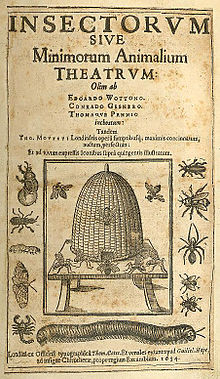Thomas Muffet
| Thomas Muffet | |
|---|---|

Title page of Theatrum Insectorum (Theatre of Insects)
|
|
| Born | 1553 Shoreditch, London, England |
| Died | 5 June 1604 Bulbridge Farm, Wilton, Wiltshire |
| Nationality | English |
| Fields | Natural philosophy, medicine |
| Alma mater | Trinity College, Cambridge |
| Known for | Insects in medicine |
| Influences | Paracelsus, T. Zwinger |
Thomas Muffet (also Moufet, Mouffet, or Moffet) (1553 – 5 June 1604) was an English naturalist and physician. He is best known for his Puritan beliefs, his study of insects in regard to medicine (particularly spiders), his support of the Paracelsian system of medicine, and his emphasis on the importance of experience over reputation in the field of medicine.
Thomas Muffet was born in 1553 to Thomas Moffet in Shoreditch, London. From the ages 8 to 16, Muffet attended the Merchant Taylors' School. In May 1569, he matriculated at Trinity College, Cambridge but transferred to Gonville Hall in October 1572. He graduated in 1573, when he received his bachelor's degree. Afterward, Muffet studied medicine with Thomas Lorkin and John Caius. Three years later, he began his master's degree at Trinity and was expelled from Gonville. In Spring 1578 Muffet boarded with Felix Platter, chief physician of Basel, where he adopted the Paracelsian system of medicine. In 1579, Muffet was awarded a doctorate in medicine from Basel University. His thesis was entitled De amodinis medicamentis (1578).
The year after receiving his MD, in 1580, Thomas Muffet studied silkworm anatomy in Italy before finally returning to England. That December, Muffet married his first wife, Jane, in St Mary Colechurch, London. Two years later, he was recognized as a qualified physician by the College of Physicians in London. This was not expected, as Muffet was a strong advocate for the Paracelsian system of medicine, which was not widely respected by the medical community. The same year, Muffet met both Tycho Brahe and Petrus Severinus, though there is no evidence as to either's intellectual influence upon him. Two years later, in 1584, Muffet finished his De jure et praestantia chemicorum medicamentorum. This document is said to have anticipated Bacon's emphasis on the advancement of learning. That same year, Muffet wrote a letter attacking the London College of Physicians for Papist influences through the lens of his own Puritan beliefs. The following year, however, he was admitted to the College of Physicians, becoming a fellow in February 1588. Later in 1588, Muffet published his Nosomantica Hippocratea, advocating support for the work and writings of Hippocrates. Nine years later, in October 1597, Muffet was elected as a Member of Parliament for Wilton. Three years later, in 1600, Muffet's wife, Jane, died. He married Catherine Brown that same year.
...
Wikipedia
